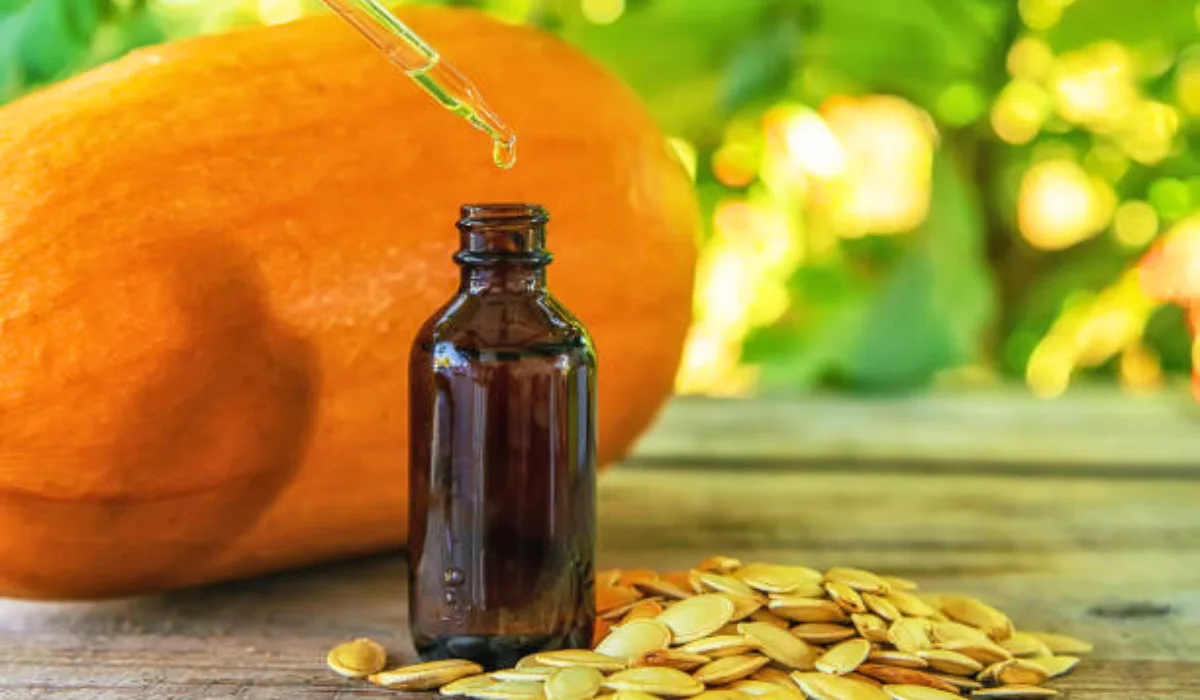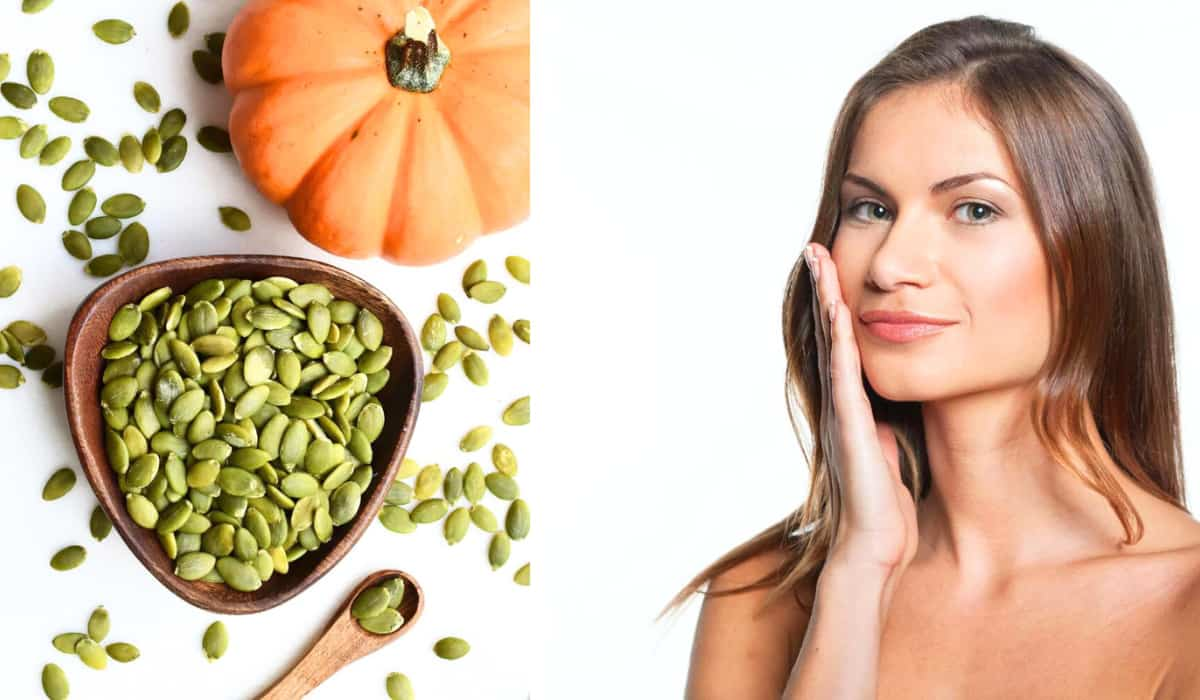Pumpkin seeds are a great ingredient if you are on any kind of diet and you might have already acknowledged its amazing health benefits. But have you known that the oil derived by processing these seeds can also be immensely helpful?
If you can make them a part of your daily skincare routine, the pumpkin seed oil can help you repair your damaged skin barrier, moisturise and hydrate your skin, make it more soft and supple, slightly exfoliate your skin, and also perform many other beneficial things. Pumpkin seed oil can also perform a range of other skincare benefits to your skin, which will be discussed in the article below.
What Are The Benefits Of Pumpkin Seed Oil For Skin?

Pumpkin seed oil, a nutrient-rich oil, can dramatically improve the health and appearance of your skin when used as part of your skincare routine. Here’s an in-depth look at its different benefits:
Fights against skin inflammation
Skin inflammation is one of the major skin conditions that is caused due to a range of different reasons. However, you may effectively treat them by making pumpkin seeds a part of your daily routine.
You may either apply this oil, topically or you can also consider having them internally to maximise the results. It is due to the amazing anti-inflammatory properties of pumpkin seed oil, that it can soothe and treat skin conditions such as acne and pimples.
Pumpkin seed oil is also proven to fight against bacterial infections such as P. acne and S. aureus which are the major causes of acne and pimples on our skin. The presence of beta carotene and a lot of other antioxidants can also effectively treat skin inflammations and acne on our skin. Studies also prove that even if you have been suffering from any chronic skin conditions, using pumpkin seed oil daily can help you have significant results.
Tackles various skin infections
Skin infections are quite common these days since most of us are highly exposed to a lot many chemical ingredients and formulations along with environmental pollution. If you are maintaining poor facial and body hygiene in general, then you are more likely to have microbial and fungal infections over time. These fungal and microbial infections can cause a lot of different skin issues apart from acne and pimples. They may include issues such as redness, blemishes, rashes, itchiness, boils, and cellulitis.
If you are struggling with the same, consuming or applying pumpkin seeds can be quite helpful for you. The presence of phloem exudate in pumpkin seeds is found to be highly effective in treating any kind of fungal infection on your face.
Heals wounds on your skin
If you have any cuts, wounds, or burns on your skin or face, you may apply a generous quantity of pumpkin seed oil on your face to heal them at a better pace. There are a lot of antimicrobial and antioxidant properties for pumpkin seed oil helping you have a speedy recovery from the same.
However, make sure that you are using a cool-pressed variant of pumpkin seed oil if you are using it for wound healing. The presence of polyunsaturated fatty acids found in seed oil can also be quite helpful in this regard. You may use it occasionally whenever you have wounds on your skin or you may use it daily, to maximise the skin health gains obtained from the same.
Delays the ageing process
Anti-ageing products and formulations can be found in the market in plenty. However, natural formulations such as pumpkin seed oil can also be equally effective when it comes to delaying the natural ageing process that you go through. The seed oil has micronutrients such as Vitamin E, Vitamin C and Vitamin A. Vitamin E is also known as the beauty vitamin, guaranteeing beauty benefits from regular usage. Apart from that, the retinol and retinoid active found in many face serums are the derivatives of Vitamin A which can be again found in pumpkin seed oil.
Apart from that, the antioxidant properties found in pumpkin seed oil can help fight against the damages caused by free radicals and thus make it more effective in delaying the ageing process. There are also other essential minerals such as zinc, magnesium, and potassium in pumpkin seed oil, helping in nourishing and rejuvenating the skin, which may prevent easy wrinkling of the skin, which is a prime sign of ageing. This can also help in tightening the skin, making it look more soft and supple. Vitamins such as B2 and B3 can contribute to the improvement of the skin complexion.
Sun protection
You can also have sun protection by using the seed oil daily as a part of your skincare routine. However, several studies suggest that the maximum benefits from the same can be obtained if you can choose cosmetic formulations that are packaged and contain the extracts of pumpkin seed oil.
You may also consume it internally so that the benefits can be doubled. Pumpkin seed oil primarily focuses on the damage caused to the skin due to the radiation caused by UVB rays. It can reduce the redness caused due to the UVB radiation.
Apart from that, it can also help in delaying ageing caused due to the damage caused due to the sun’s radiation. The reduction in the production of collagen can also be fixed if you can use the oil or formulations containing pumpkin seed oil.
Some studies also claim that the oil can also effectively increase collagen production and thus give you are softer and younger appearance to your skin. Skin cancer caused due to UVB radiation can also be prevented with the same.
Wrap Up
Now you know how to use pumpkin seed oil for the benefit of your skin. However, it is important to make sure that you are not using this particular ingredient to take care of your skin and maintain the overall health of your skin.
It is also vital to follow healthy dietary habits so that you can have all the essential micronutrients for the improvement of your skin texture and appearance. Make sure you are not having deficiencies by undergoing routine blood tests so that you will not feel disappointed by doing all these.
References:
- Okada M Ed. Newly Revised Illustrated Medicinal Plants of World; Hokuryukan Publishing Co., Ltd.: Tokyo, Japan, 2002, p. 514. [Google Scholar]
- Atta-Ur-Rahman, Z.K., 1989.Medicinal plants with hypoglycaemic activity. J. Ethnopharmacol 26, 1–55.

